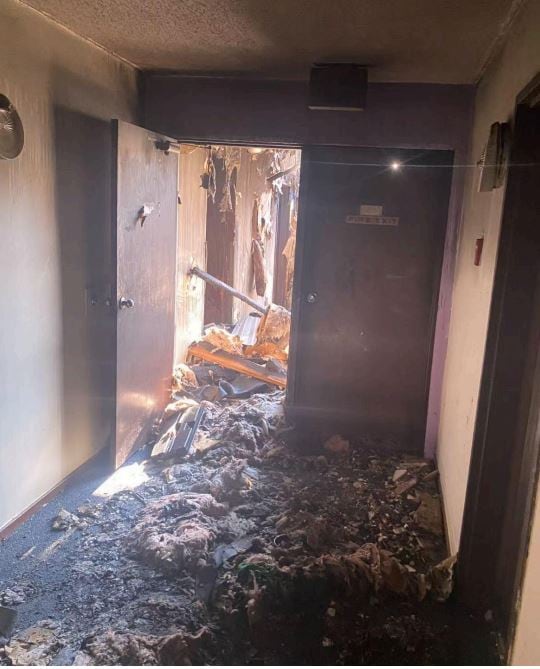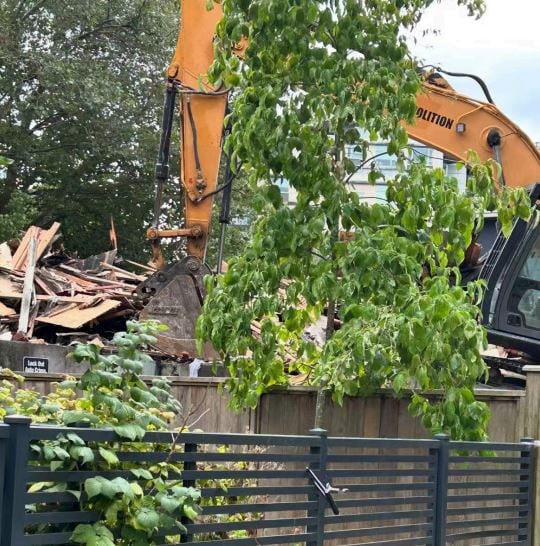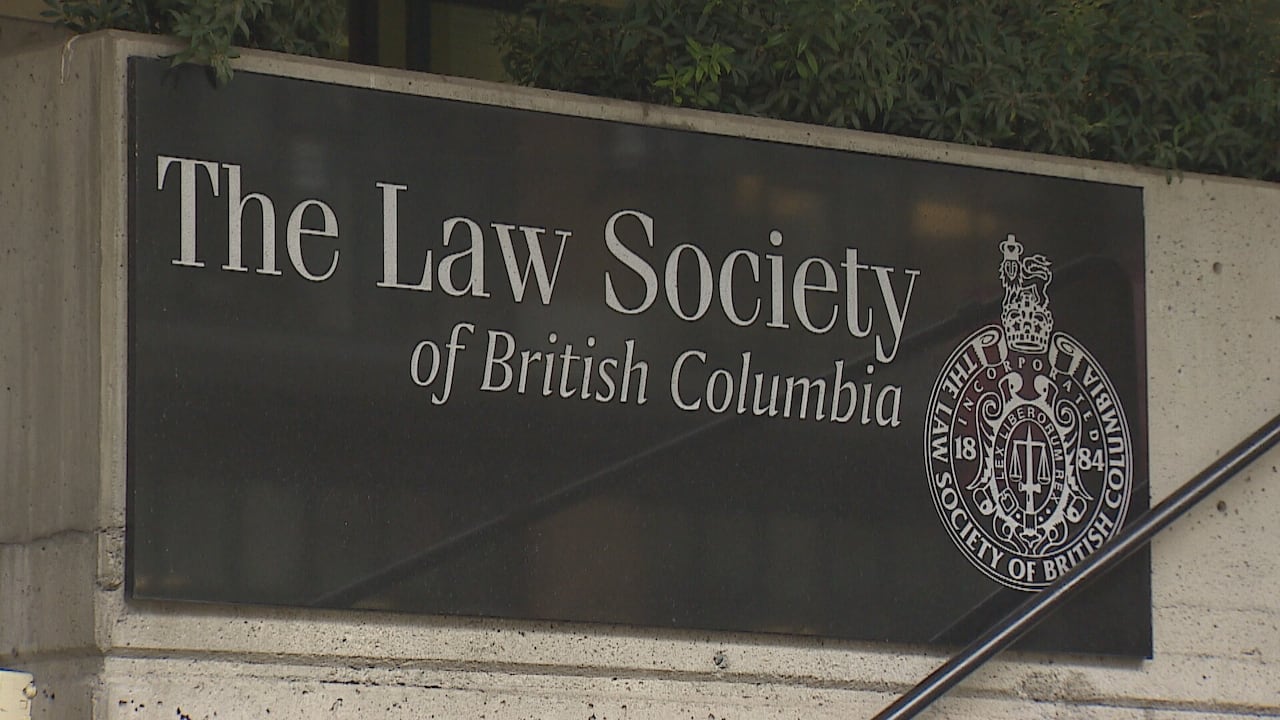As the owner of a fire-ravaged property he’s been accused of neglecting, Fu De Ren has defended himself in both civil proceedings and bylaw trials.
But the East Vancouver landlord may be forced to pay for his latest attempt at self-representation: a bid to cut his property’s assessed value by nearly half — from $19 million to $10 million.
According to the board that hears assessment appeals, Ren’s arguments are riddled with fictitious case law — possible artificial intelligence (AI) “hallucinations” that sent B.C.’s assessment authority on a wild goose chase in search of legal precedent that doesn’t exist.
Now, the board says Ren may have to pay for those mistakes.
“The unraveling of these falsehoods has required investigation and research by both the Assessor and the Board,” board panel chair John Bridal wrote in an Oct. 7 decision.
“I find an order for costs may be warranted, reflecting the additional time of both the Board and the Assessor in addressing this matter.”
‘The human … remains responsible’
Ren’s battle with B.C. Assessment is the latest chapter in a story that began more than two years ago with a massive fire that rendered the low-rise apartment building that used to sit in the 400 block of East 10th Avenue uninhabitable.
In the time since, another fire resulted in an order for the demolition of the remaining structure, and Ren has fought with tenants, bylaw officials and the city over his alleged neglect of the property and his reluctance to pay for tearing down what was left of it.

But beyond the specifics of Ren’s fights with authorities, his submissions to the property assessment appeal board have landed him in the middle of an issue currently plaguing B.C.’s many courts and tribunals.
CBC News has found multiple examples of judges calling out fictitious citations manufactured out of thin air — so called AI hallucinations — in material filed by self-represented litigants in proceedings in the past year, ranging from the B.C. Court of Appeal and B.C. Supreme Court, to small claims court and the Workers’ Compensation Appeal Tribunal.
Not all humans, even those with natural intelligence, are always truthful– Appeal court registrar Timothy Outerbridge
Last year, the situation led to a reprimand and an order for costs against a lawyer who used ChatGPT in her bid to help a divorced millionaire win the right to take his children to China.
And more recently, AI hallucinations have led to directives and warnings from court and tribunal administrators.
“Generative AI tools can be useful to self-represented parties to distill and understand complex legal principles. However, they are not designed to always provide truthful answers but instead to be human-like in their interactions,” B.C. Court of Appeal registrar Timothy Outerbridge wrote in a decision posted online earlier this month.
“Not all humans, even those with natural intelligence, are always truthful. This Court is aware generative AI is being used by some, but like any litigation aid, the human behind the tool remains responsible for what comes before the Court. “
A ‘vacant, fire-damaged development site’
Ren’s 2025 property assessment came in at $19,082,000 — the estimated actual market value of 414 East 10th Ave., as of July 1, 2024.
In his appeal, Ren claimed the “valuation is based on a fundamentally incorrect comparison to an income-producing apartment building, and it fails to reflect the true condition, nature, and market appeal of my property.”

According to submissions obtained by CBC News, Ren argued the “vacant, fire-damaged development site” shouldn’t be equated with a “cash-flowing, intact multi-unit asset.”
He noted that while the property went on sale for $20 million last November, it drew no bids, despite four price reductions. The lot is now listed for $13.5 million.
Ren’s appeal also included copies of $2 million worth of invoices from the city demanding recompense for money taxpayers spent securing and razing his property — an amount Ren said should be deducted from the assessed value.
To underpin his arguments, Ren cited decisions from B.C. Court of Appeal, B.C. Supreme Court and the Property Assessment Appeal Board itself as “legal precedent” and “additional legal authority.”
One of them — Polaris Realty v. Assessor — purportedly spoke directly to his concerns: “An appraisal that fails to deduct disaster-related costs is legally invalid.”
‘The cases … are fictitious’
But in a rebuttal to Ren’s submission, B.C. Assessment senior appraiser Andrew Loi said there was no trace of Polaris Realty v. Assessor on Canadian legal databases.
The same held true for the rest of Ren’s citations.
“The referenced cases do not exist, nor do the referenced quotes,” Loi wrote.
“All of the cases that the appellant cites to support his position are fictitious and do not exist.”

In his decision on the assessment itself, Bridal mostly sided with Loi, who pointed out that actual market value is based on the “highest and best use” of a property — which in Ren’s case is for the kind of “high-density residential tower” allowed by a new city vision for the area.
He lowered the overall assessment by $900,000 to account for the “associated risk in purchasing this partially demolished property.”
The referenced cases do not exist, nor do the referenced quotes– B.C. Assessment senior appraiser Andrew Loi
But he took pains to point out the “possible” AI hallucinations in Ren’s arguments.
“This might indicate a lack of care and attention to detail,” Bridal wrote.
“A worse alternative is that the submission has been purposely falsified with knowledge and intent.”
‘It can lead to a miscarriage of justice’
Last April, the Property Assessment Appeal Board introduced a participant code of conduct requiring participants to “clearly disclose that AI was used” if evidence is generated or supported by artificial intelligence.
Ren’s case is the second time in the past two months the board has encountered submissions citing non-existent case law.

In September, the owner of a $1.1-million residential property on Vancouver Island was “put on notice” in relation to two cases they referenced in an attempt to knock $200,000 off the assessed value of their home.
“I was unable to locate the cases,” wrote board panel chair Phillip Yang.
“In the absence of any substantiation, I can only conclude that the cited cases do not exist and may have been generated with the assistance of artificial intelligence.”
Several of the cases in other courts found by CBC News reference the 2024 B.C. Supreme Court decision in which a B.C. judge first levied costs in relation to AI hallucinations.
In that proceeding, Justice David Masuhara ordered lawyer Chong Ke to personally compensate her client’s ex-wife’s lawyers for the time they took to chase the cases she conjured up through ChatGPT.
“Citing fake cases in court filings and other materials handed up to the court is an abuse of process and is tantamount to making a false statement to the court,” Masahura wrote.
“Unchecked, it can lead to a miscarriage of justice.”
Bombarded with ‘endless legal arguments’
This June, a B.C. Supreme Court judge in Kelowna ordered a woman who represented herself in a custody proceeding to pay her former spouse $200 for citing non-existent cases.
The woman apologized to the court and said she had not previously been aware AI was “capable of providing non-existent case citations.”

The Law Society of B.C. has issued warnings to lawyers about the consequences of relying on AI to draw up arguments, but most people caught out by AI hallucinations in recent months have been self-represented.
Hiring a lawyer can be expensive, and the justice system can be difficult for legal professionals to navigate, let alone ordinary citizens like Ren — who has required the assistance of a Mandarin interpreter at his bylaw trials.
People who blindly use artificial intelligence often end up bombarding [the tribunal] with endless legal arguments– Civil Resolution Tribunal vice-chair Eric Regehr
As a result, decision makers appear to be grappling with the question of AI and its costs at the small claims, tribunal and board levels — where claimants and respondents frequently argue on their own behalf.
This summer, Eric Regehr, vice-chair of B.C.’s small claims tribunal, heard a dispute in which both parties somehow conjured up a “hallucinated version” of the legislation governing the tribunal.
“People who blindly use artificial intelligence often end up bombarding [the tribunal] with endless legal arguments,” Regehr wrote.
Just a few months earlier, Regehr ordered a different woman to pay $500 to a gas station owner she accused of denying her service as compensation for the time he spent chasing her arguments down rabbit holes.
“It takes little time to have a large language model create lengthy submissions with many case citations,” Regehr wrote.
“It takes considerably more effort for the other party to wade through those submissions to determine which cases are real, and for those that are, whether they actually say what [the other party] purported they did.”
‘Submitted in good faith’
Even B.C.’s Workers’ Compensation Appeal Tribunal went to the unusual length of publishing a dismissal this summer as a means of informing the public about the dangers of relying on AI.
Deputy registrar Hilary Thomson said inaccuracies in an AI-generated submission won’t help a worker’s case.
“I accept that artificial intelligence can be an exceptionally helpful tool at times,” Thomson wrote.
“However, while the technology continues to evolve, at the moment it is not a reliable tool for legal research and it should not be relied on for legal cases.”
Ren did not reply to questions about his appeal sent to an email address previously used in correspondence with CBC News.
Bridal gave Ren until Oct. 21 to submit further submissions “to explain why the board should not seek its costs.”
Ren’s original submissions conclude by saying his appeal was “submitted in good faith, based on clear facts, legal precedent, and international professional standards.”
“I urge the Board to adjust the valuation to reflect the true, fair market value of a vacant, non-producing, fire-cleared development site in today’s oversupplied and cautious investment climate,” Ren wrote.
www.cbc.ca (Article Sourced Website)
#hallucinations #prove #real #problem #controversial #owner #fireravaged #property #CBC #News
